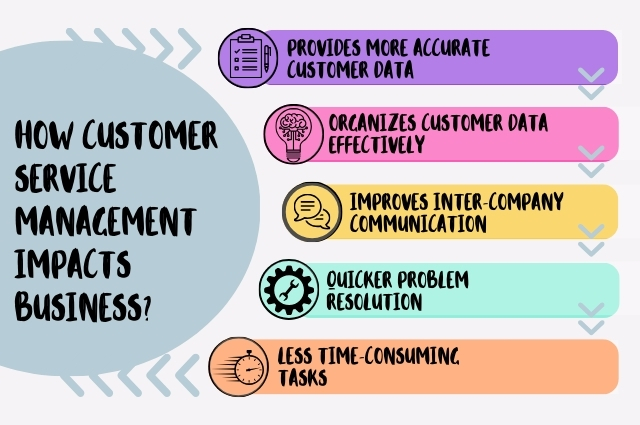
How Do You Choose The Right Customer Service Management Software?
Effective customer service management is integral to a business’s success, as satisfied customers are the lifeblood that keeps the profit machine running smoothly. In this blog, we will explore the significance of customer service management, its impact on business, and the crucial factors to consider when choosing the right customer service management software.
What is Customer Service Management?
Customer Service Management is like a guide that helps businesses handle interactions with customers, making sure their experience is smooth and enjoyable from start to finish. It’s not just about answering questions; it’s a promise a company makes to its customers to provide good support before and after they buy something.
According to research, 82% of customers will recommend a company that provides excellent customer service. This is important because many people are ready to leave a brand that doesn’t meet their needs. 71% of customers switched brands in the last year, and 48% did it because they wanted better customer service.
No matter if you’re a big company or a smaller one, how you treat your customers matters at every step. To do this well, you need good processes for managing customer information and keeping them satisfied. Luckily, there are tools and best practices that make customer service management easier for both customers and your team.
What is The Importance of Customers to Any Business?
It may seem that the quality of products or services is the primary driver of an organization’s success. However, the key lies in the ability of the business to communicate the value of its products or services to potential customers. Business success is largely determined by the company’s relationship with its customers. Managing a healthy relationship ensures not only builds customer trust in the product but also encourages them to share their positive experiences with friends, family, and colleagues.
Therefore, the best-performing organizations are increasingly recognizing the importance of managing good customer relationships. Several high-performing businesses plan to expand their customer service teams to provide the best possible service.
How Customer Service Management Impacts Business?

Customer service management plays a pivotal role in improving the company-client relationship. Five key features highlight its significant impact on business
1) Provides More Accurate Customer Data:
Accurate customer data is essential for assessing and understanding customer needs. CRM systems offer actionable information on customer preferences, purchase history, and other details. High-performing service teams report the ability to predict customer service needs more than 80% of the time, thanks to the precise understanding of client preferences.
2) Organizes Customer Data Effectively:
Acquiring data is only the first step; organizing it for future reference is equally crucial. Quality customer service management systems ensure that data is easily accessible, preventing valuable information from slipping through the cracks.
3) Improves Inter-Company Communication:
CRM platforms provide a unified space for all individuals, teams, or departments involved in customer satisfaction goals. This reduces compatibility issues, enhances organizational efficiency, and ensures that every stakeholder can access the necessary data.
4) Quicker Problem Resolution:
A common platform for everyone involved in customer satisfaction facilitates quicker and more efficient problem resolution. This eliminates unproductive bouncing around between customer service representatives, enhancing the overall customer experience.
5) Less Time-Consuming Tasks:
By increasing customer service efficiency, CRM systems significantly impact the bottom line. Time-consuming tasks are reduced, resulting in cost savings and improved overall operational efficiency.
Also Read: Salesforce Pipeline Management: 8 Tips to Improve Your Team’s Productivity
Choosing the Right Customer Service Management Software
The decision to choose the right customer service management software is critical for businesses aiming to enhance customer satisfaction and drive overall success.
a) Understand Your Business Needs:
Before exploring various customer service management software options, businesses must have a clear understanding of their specific needs. Identifying pain points, challenges, and areas requiring improvement is important. Whether it’s streamlined data collection, enhanced communication, or efficient problem resolution, a thorough understanding of the business’s unique requirements forms the foundation for choosing the right software.
b) Evaluate Scalability:
As businesses grow, so do their customer service needs. Choosing a scalable customer service management solution ensures that it can adapt and expand alongside the organization. This scalability is particularly crucial for long-term success and avoiding the need for frequent software changes.
c) Consider User-Friendliness:
The effectiveness of any software solution depends on its adoption by the end-users. Opting for a user-friendly customer service management system enhances the likelihood of successful implementation. The interface should be intuitive, requiring minimal training for employees to navigate and utilize its features effectively.
d) Ensure Integration Capabilities:
In the modern business landscape, various tools and systems contribute to overall operations. The chosen customer service management software should seamlessly integrate with existing tools, such as marketing automation, sales, and analytics platforms. This integration ensures a cohesive and efficient workflow across the organization.
e) Prioritize Customization:
Every business is unique, and a one-size-fits-all approach may not address specific needs adequately. Prioritizing customization options in a customer service management solution allows businesses to tailor the software to their specific requirements. Whether it’s custom fields, workflows, or reporting functionalities, the ability to customize ensures optimal alignment with business processes.
f) Assess Reporting and Analytics:
Data-driven insights are invaluable for informed decision-making. A robust customer service management software should offer comprehensive reporting and analytics features. Businesses can assess the software’s ability to provide actionable insights, track key performance indicators (KPIs), and generate reports that aid in continuous improvement.
g) Consider Mobile Accessibility:
In an increasingly mobile-centric world, the accessibility of customer service management software on mobile devices is crucial. Evaluate whether the software provides a mobile-friendly interface or dedicated mobile applications. This ensures that users can access essential features and data while on the go, contributing to flexibility and responsiveness.
How Is Salesforce Service Cloud Helpful for Your Business?
Today’s consumers expect seamless and personalized interactions with brands, and meeting these expectations is important for business growth. Salesforce Service Cloud is a powerful customer service platform designed to elevate your business’s customer support game to new heights.
Here’s how it helps businesses:
A) Streamlined Customer Interactions:
Salesforce Service Cloud empowers businesses to provide a unified and streamlined experience for their customers. With a 360-degree view of each customer’s journey, businesses can effortlessly manage and respond to customer inquiries across various channels like email, social media, chat, or phone.
B) Personalized Service:
Understanding your customers on a personal level is key to building lasting relationships. Salesforce Service Cloud utilizes advanced analytics and artificial intelligence to gather insights from customer interactions. This data allows you to customize your services and deliver a more personalized experience.
C) Omnichannel Support:
Customers expect support on their preferred platform and Service Cloud facilitates omnichannel support, enabling your team to seamlessly switch between channels without losing context. This ensures that every customer interaction is comprehensive, leading to quicker issue resolution and an overall improved customer experience.
D) Automated Follow-Up:
With automated follow-ups, businesses can swiftly address concerns, showcasing a commitment to customer satisfaction. This ensures your services evolve in sync with customer needs, establishing a customer-centric edge that propels your business forward.
E) Scalability and Flexibility:
As your business grows, so do your customer service needs. Salesforce Service Cloud is scalable and adaptable, capable of evolving with your business. Whether you’re a small startup or a large enterprise, the platform offers the flexibility to customize processes, ensuring that it aligns seamlessly with your unique business requirements.
Ready to Transform Your Business?
Choosing the right customer service management software is a critical decision for businesses aiming to enhance customer satisfaction and drive overall success.
CRM Masters as a Salesforce Consulting partner helping businesses leverage the potential of the Salesforce platform. We have been helping our clients in different industries for so many years now with our dedicated team of expert developers.
Contact us to know more!












